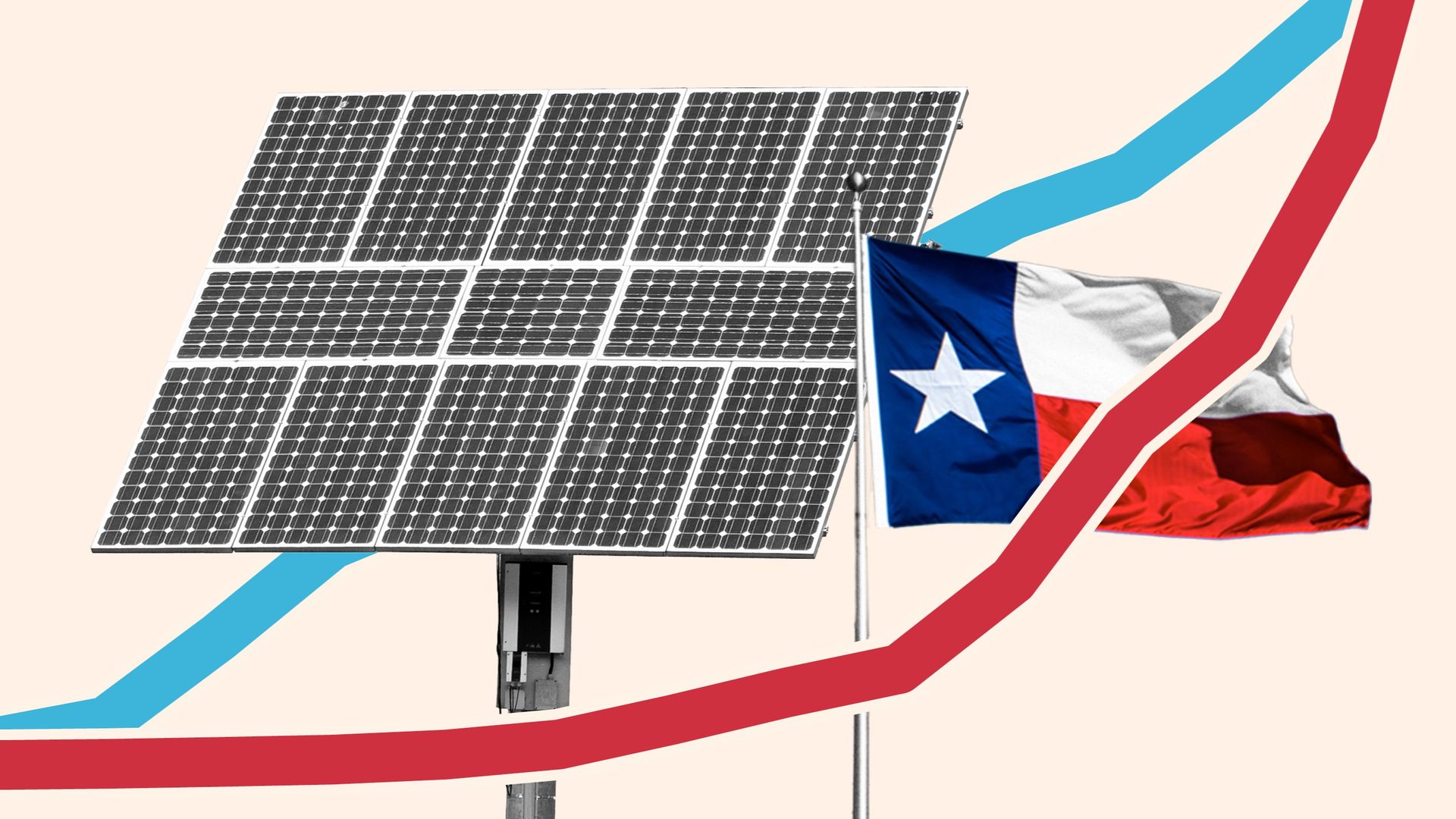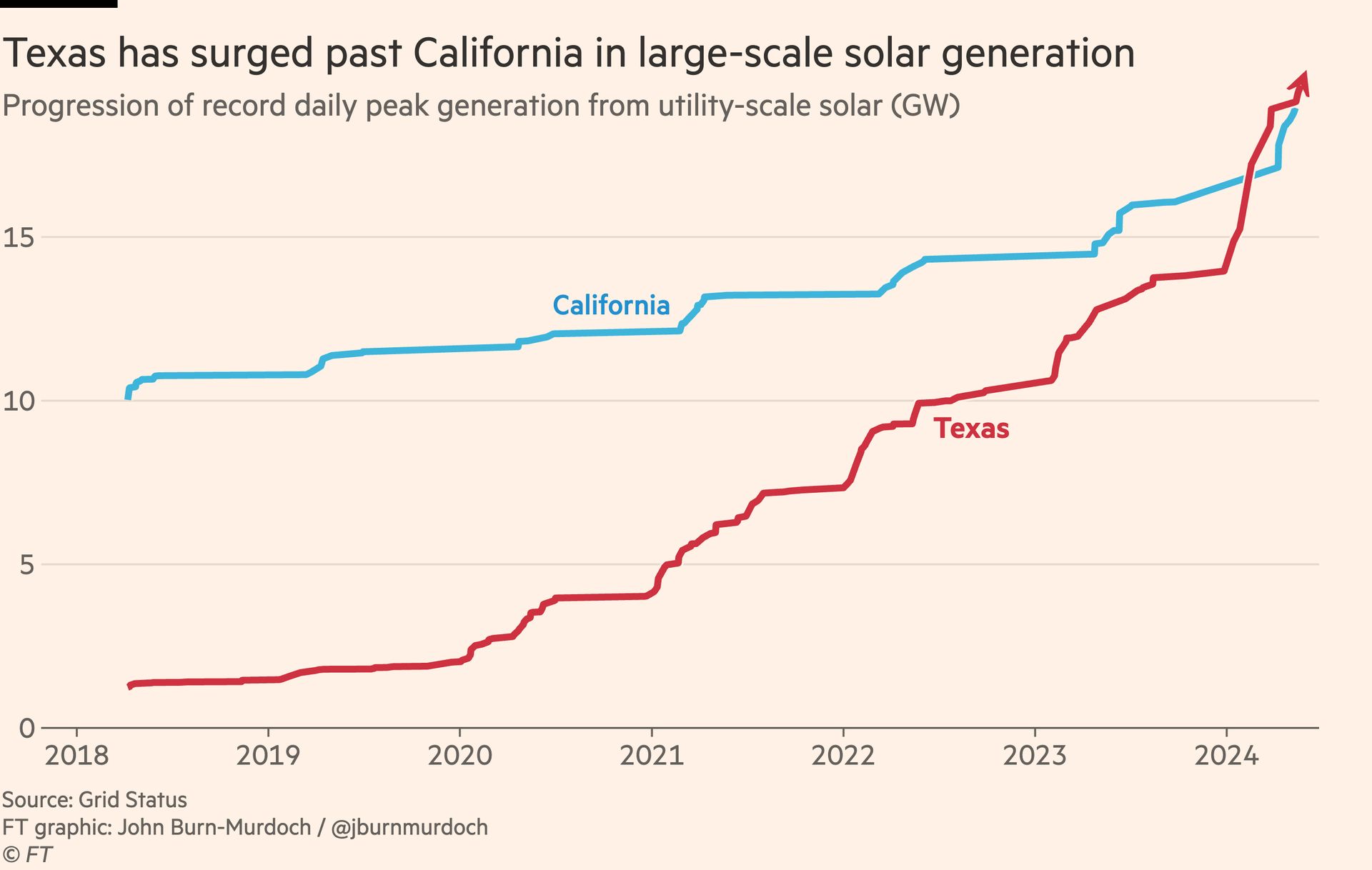A remarkable thing happened in March this year. For the first time, the fossil fuel rich state of Texas generated more electricity from solar power than from coal.
Perhaps even more striking, on the early afternoon of May 14, Texas briefly hit 19.1 gigawatts of energy generation from solar farms. This set a new US-wide record according to figures from Grid Status, which tracks electricity generation data across the US.
What makes the achievement even more significant is the state that Texas pushed into second place: California. A progressive stronghold that has mandated clean energy targets for more than 20 years and built up a dominant lead in utility-scale solar energy, it was outshone by a Republican-led fossil fuel powerhouse, governed by a serial obstructor of clean energy legislation.
As recently as five years ago this would have been unthinkable. In 2019, Texas had just over 2GW of large-scale solar plants to California’s 13GW. Since then, however, the Lone Star State has entered into a solar boom. As of this month it has deployed 23.6GW of utility-scale solar to California’s 21.2GW.
When the latest batch of solar plants come on line, Texas will have added more solar capacity per capita in a single year than any US state and any country in the world, according to data from energy think-tank Ember. Almost overnight, a state synonymous with dirty fuels has become America’s clean energy giant, and the trend is still accelerating.
Texas is still heavily reliant on gas, but its transition towards clean energy is emblematic of a dynamic that plays out time and time again in climate discussion: economics has a habit of winning out over politics and ideology. The fact that most Texans want to increase fossil fuel production, and are more hostile than the average American to clean energy targets, is powerless in the face of financial incentives.
It’s not that politics don’t matter. But economics, which shape politics, can turn even the biggest climate change sceptic into a clean energy evangelist. This is exactly what has happened in Texas, where an unlikely coalition for clean energy has formed. Urban progressives in blue cities like Austin have been joined by rural west Texas conservatives who recognise that renewable energy is becoming a critical source of economic development for their communities.
Despite accounting for only a tiny portion of the state’s population, rural counties will receive more than 60 per cent of the tens of billions of dollars expected to flow into Texas from renewables and storage over the coming years, according to a report by Joshua Rhodes, an energy policy expert and research scientist at the University of Texas at Austin.
Notably, the report is full of pro-renewable testimonials from small business owners, ranchers and Republican politicians. It was funded by a conservative organisation and pro-business think-tank. Gone are the days when pamphlets extolling the virtues of clean energy were the preserve of progressive non-profits appealing to the reader’s better nature.
Perhaps the clearest sign yet that economics has transformed the politics of climate change in Texas came last year, when several proposed legislature bills aimed at making it harder to build new solar and wind installations failed to make it to a vote.
The ease of building and connecting new renewable projects in Texas relative to elsewhere has been one of the key reasons for the state’s clean energy boom. Its electricity grid operator uses a “connect and manage” model. This assesses new projects based on the essential local requirements needed to connect to the grid instead of carrying out protracted studies into the broader potential ramifications.
The result is that new power generation takes about half as long to come online in Texas as elsewhere. The US Federal Energy Regulatory Commission is now looking to follow a similar approach in order to speed up the transition nationwide. Red Texas has become the model for going green.
The polarised nature of US political discourse can make it seem as if renewables are still a divisive topic. But shift your gaze from cable news to the plains of Texas and a different story is unfolding. For those with skin in the game and an eye for a good investment, clean energy has become a no-brainer.
john.burn-murdoch@ft.com, @jburnmurdoch





